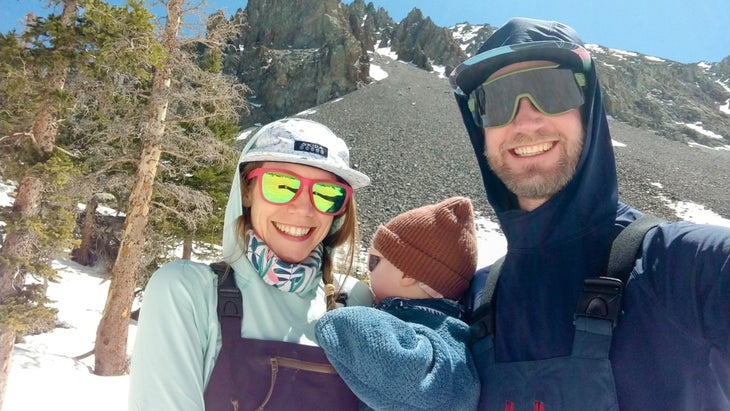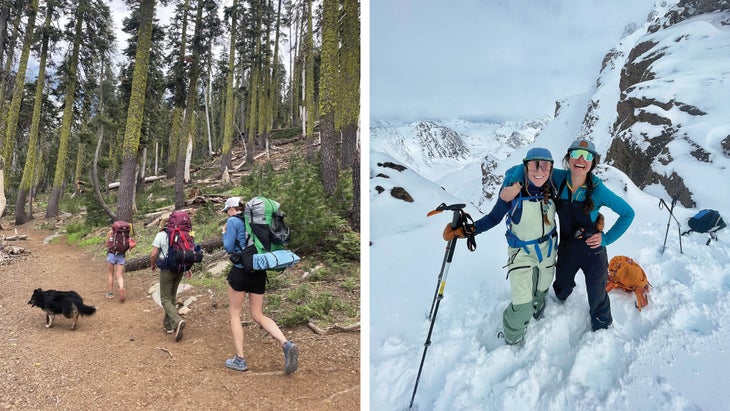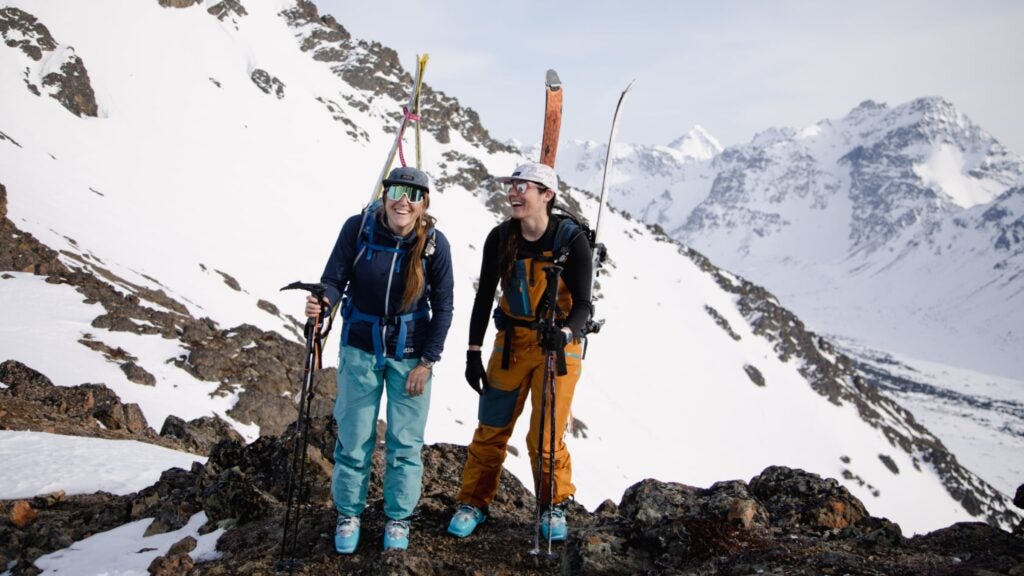No products in the cart.
Outdoor Adventure
All My Friends Are Having Babies. Can We Adventure Anyways?
Whenever there’s an incoming powder day, I start to shuffle through my internal rolodex of ski partners. They’re loosely grouped in my mind: the mellow lap and tailgate aprés enthusiasts, the ski mountaineers trying to push it on technical lines, and the diehards who are up for a tour even if it’s raining or the dead of summer. Some friends, though, transcend all categories. I think of them as the adventure partners you hold onto with both hands.
My friend Debrah Arriola-Jacobson has always been at the top of this list. We both moved to Truckee, California, in the summer of 2018 to work at an outdoor school and quickly became inseparable, chatting about ski lines over tupperware lunch on recess duty, training for ultramarathons on the Pacific Crest Trail after work, truck camping on weekends in the Eastern Sierra. When our paths merged, we were living fairly similar lives.
After four years of adventures together, Debrah told me she and her husband were pregnant while we were on a trail run. I looked down at my feet, hopping over slabs of granite, immediately flooded with conflicting emotions. On the one hand, I was thrilled for her and her husband, Michael—they’d gone through a harrowing miscarriage earlier that year, and getting pregnant again was great news. And on the other hand, I felt the tiny claws of a nagging thought sinking into my brain: everything is going to change now. But I didn’t want to take up space with my reaction. This moment was about them. So I stuffed it down, twisting the grief into a small knot in the pit of my stomach.
The state of parenthood in the U.S. has changed in the last couple generations. According to a 2017 study, over two-thirds of Americans between 25 and 34 were raising a child in 1980. In 2015, the same was true for just over half of that same age group. A 2023 study from the Pew Research Center indicated that 44 percent of non-parents between the ages of 18 and 49 were not very or not at all likely to have children, which means that more and more of us are running into this divide in our friendships.
And friendship, of course, really matters. According to the Mayo Clinic, adults with close friends are at a lower risk of experiencing health problems like depression and high blood pressure. When the COVID-19 pandemic struck in 2020, I was single, living alone in a basement apartment under an A-frame with a bedroom I couldn’t stand all the way up in. My friends stepped up to support me in ways a romantic partner might have, and were critical to my mental and physical health. That summer, when I ran the eight sections of the 175-mile Tahoe Rim Trail, my friend Callie Martin and her five-year-old son shuttled me, bringing me snacks and recovering with me at the lake. When I ran a 50-mile trail race in the Bay Area, Debrah trained with me for months and crewed me through the last ten miles. When I had a COVID scare and had to spend Thanksgiving alone, my friend Kate Robinson left a full meal outside my doorstep to make it feel a little less crappy.
In these friendships, we had really put in the time. A 2018 study in The Journal of Social & Personal Relationships found that it takes 200 hours to make a close friend—a number much easier to arrive at when you’re out on all-day missions in the mountains, and when you’re in your twenties with relatively few responsibilities.
I am not planning on becoming a parent. I used to think that decision would affect just me and my partner—I hadn’t considered the way it might influence my community. But when Debrah got pregnant, and Kate just a few months later, I realized that the choice not to have children is bigger than the child you do or don’t have. I began to wonder whether our choices about children were sending us down different lanes of life, definitively, inexorably, forever. One fall afternoon in 2022, I listened to Kate and Debrah talk to Callie about mom stuff as we hung out at the river after work and my gaze drifted toward the water, knowing I’d never be part of the club.
As Debrah and Kate’s due dates loomed closer, and then as their children arrived, my worries about the future of our friendships grew. Would we stay friends, even as our life paths diverged? Would I have to start over and find new adventure buddies? Would time with my community start to look like kids’ birthday parties and perpetually interrupted conversations?
In my search for answers, I interviewed dozens of friends—parents and childfree folks both—to talk about how their relationships have changed. I learned that certain habits and friendships are easier to maintain than others. Continuing to go to brunch with your pregnant friend on Saturday morning is easy. Keeping up those eight-hour runs may be a little more difficult.
Many new parents know that, at least for now, the type of objectives they’re looking at in the outdoors have to change. Long, technical, and spontaneous adventures are harder for new parents to pull off. Childcare hours eat into available outdoor recreation time, especially if parents are also working.
A 2017 study found that 39 percent of parents with children under 18 have less than two hours of leisure time a day, whereas 33 percent of non-parents had more than 5 hours of leisure time a day. Debrah says she chooses objectives closer to home, so her free time isn’t wasted in the car. Kate describes her reaction to watching childfree friends continue to adventure being, “Eighty-five percent heck yeah sister, get after it, and fifteen percent jealous.”
According to the Pew Research Center, in heterosexual partnerships, moms still spend twice as many hours a week as dads do on childcare. (Some of the queer couples I spoke to note the child bearer versus non child-bearer difference, but don’t feel that gender roles affect the equity of their parenting.)
My friends Ben Leoni and Lindsay Bourgoine, both avid backcountry skiers, observed this imbalance after they had their son, particularly while Lindsay was breastfeeding. “I could potentially get out for a day to go backcountry skiing and she never really felt like she could, because she had to pump,” Ben tells me.
The inequity of this gave him pause. “If I went skiing for the day, I know that that puts a major additional burden for the day on my wife, right? If I’m going to take the load off my side of the scale, it’s going directly onto my partner,” he says.
Getting out together, he says, even with the support of family close by, is extremely difficult.

My friend Lauren Deeley, a 39-year old financial advisor living in Golden, Colorado, notes that when it comes to her friends in cis-hetero partnerships, it’s easier to make plans with the men than the women. Many people I spoke with echoed this. Some of that has to do with biological realities like pregnancy and breastfeeding—after Debrah gave birth, she told me she struggled to balance her desire to get outside with friends and her need to let her body recover. But parents also come up against stereotypical gender roles and expectations around parenting. “It [can be] a little easier for people in male bodies with children to get the hall pass,” Deeley says. “It seems like those folks have an easier time disconnecting from the parent identity.”
Before he became a parent, Ben remembers being nervous about making plans with parent-friends because they would often have to bail at the last minute. Now, being a dad, he can empathize—and is cognizant of trying not to put his touring partners in the same position. Ben says he’s more risk-averse in the backcountry, and his bigger adventures have taken a backseat for now.
But several of the parents I spoke to were bummed that their unattached pals assume they’re unavailable to do things without even checking first, a phenomenon that a 2023 New York Magazine article described as “mom-blocking.” Getting outside with kids and arranging childcare may call for Ph.D.-level logistics and ample notice, but that doesn’t mean that they don’t want to be invited.
Michael and Debrah try to combat this by having a reliable schedule so their friends know when and for how long they’ll be free. They split up weekend days so each of them has the chance to get out for a half-day adventure, and each takes a shift with their daughter. This means they both get to get out, even if only for a few hours at a time.
There are undeniable upsides to friendships across parent-nonparent lines. On sunny winter days at Palisades, I ski with Callie’s son, sessioning jumps in the park and practicing GS turns on long groomers. Callie is an outdoor-lover, but not an extreme athlete, and she’s glad that her son has other adult role models in his life to show him things she can’t. This dynamic is mutually beneficial. My friend Kit, a 39 year-old supply chain assistant director in Denver, Colorado wants kids but hasn’t met the right partner yet. She’s close with her 16-year-old niece, who considers Kit a role model—which has been healing for her. “It’s pretty cool to have my niece look at my life and see that as a goal, where my mom might think of me as not successful,” she tells me.
Callie also shares that she appreciates her childfree friends’ open, flexible schedules. “You guys were always doing something, so it was easy for me to jump in,” she says. Ben echoes this sentiment—he knows that if he winds up having a last-minute window of availability, his childfree friends are more likely to be able to join.
In some situations, parenthood can actually make social connections stronger with non-parents. Callie spent the first few years of her son’s life as a single parent. Without a partner to rely on, her friends stepped up to support her, and her relationships during that time were stronger than ever. It’s easier for two-parent families to become insular “because they have that safety net,” Callie says. “For single parents, friends become their partners.”
No matter how confident I feel about not wanting an infant now, I worry about getting cut off from community as I age. I decided to check in with a few parents and childfree folks in their late forties and fifties. They all admitted that many of their friendships changed when kids came into the picture, as they either spent more time around other parents in the school pick-up line or at birthday parties. Older childfree people started to seek out younger adventure partners or others without children. I listened with forlorn resignation, wondering if I’d be saying the same thing in twenty years, surrounded by completely different friends.
When Debrah told me she was pregnant, I swallowed my feelings for months. I’m not alone. Childfree people are talking to childfree people, and parents are talking to parents. But rarely does anyone tell me about sitting down with their friends across the aisle to talk about their friendship. Instead, we go through this sea change quietly—without expressing our feelings, setting expectations, and clearly identifying a way forward that will help our friendships survive. We have these types of check-ins with our romantic partners, so why not our friends?
I decide to give it a shot. What if we trust that our friendships are strong enough to handle tough conversations?

I start with Kate. She is one of the kindest, most accepting humans I know, so I don’t have much to be afraid of, but I still feel my voice catch in my throat as I start to describe the grief I’ve felt as our friendship has changed. It turns out, though, that by sharing my full range of emotions, I’m giving her permission to do the same.
She expresses how society makes people feel like they have to have kids, and they have to feel good about it all the time. “There’s no room for women to grieve the loss of the previous independence that they had, and how life changes and things change with your friendships. And that’s hard. Those are things worth grieving,” Kate says.
I tell Callie I’m worried about feeling isolated now that the three of them can now connect about this experience I won’t ever be able to understand. She laughs and tells me that Kate and Debrah having babies makes her feel like she’s 85. “The advice I have to offer is useless,” she says. “They have all these gadgets I’ve never heard of. They have conversations where they might as well be speaking in another language. And it’s only been eight years.”
I am floored—I never imagined that she also felt like an outsider. We come to so many invented conclusions about peoples’ experiences when we don’t take the time to ask what they’re going through.
Talking to Debrah is the hardest. We were each other’s longtime go-to adventure partners, and the loss is greater, more noticeable. I feel a physical ache when I think about overnight camping missions to ski Mount. Lassen and run 20 miles through Yosemite together, wondering if moments like those will ever come again. It’s impossible not to cry as I say all the things I should have said many months ago—expressing grief, uncertainty, and insecurity. “Our friendship is the reason I’m writing this article,” I tell her.
It turns out, Debrah isn’t upset with me at all. She totally gets it. She describes pregnancy as magic, but admits that it also kind of sucks. “It’s one of the loneliest experiences ever, because only you can feel what’s going on in your body,” she says.
I didn’t know she was feeling that way at the time. She tells me, during the winter she was pregnant, that it pained her not to be able to get out together in the same way. She is grieving our changing relationship, too.
I leave each of these conversations feeling closer to my friends than I did before. I start to wonder how many opportunities for deeper connection we leave on the table because we’re afraid of acknowledging the true complexity of our experiences.
Rebekah Cochrane, an outdoor enthusiast who lives with her wife and young daughter in Missoula, thinks outdoor folks are particularly well set up to have these kinds of chats. “When you’re out doing adventures, you talk about how you’re feeling about a situation or what decisions you’re going to make together,” she says. “There are a lot of parallels.”
Maybe we’ve actually been preparing for these conversations for years, as we discussed pertinent hazards on the skintrack, managed different risk tolerances on knife-edge ridgelines, showed up for each other through crux pitches, or expressed our uncertainty about continuing on through a storm. Maybe we already have everything we need.
When Debrah’s daughter was five months old, my partner, Andy, and I moved to Alaska in order to be able to afford a home in a place with mountain access—a decision that arguably affected my friendship with Debrah more than her decision to have a child. So many choices in adulthood can send us down different paths: new jobs, budding homestead operations, caring for ailing parents. It’s not just kids.
While preparing to leave, Andy and I repeated the phrase “you’ll have to come visit!” dozens of times, to everyone we would dearly miss. As an evangelist of the church of You-Can-Always-Crash-On-My-Couch, I really meant it. But it’s much easier for people to say they’ll come visit you than to actually do it. Especially if they have kids, I thought to myself dejectedly.
A few months after we moved, I received an excited text from Debrah with a screenshot of flights from Reno to Anchorage during my school’s spring break. “Booked!!” it said underneath. She was the first friend, kids or no kids, to commit to making the trek.
Source link

